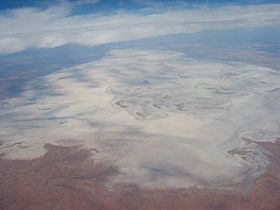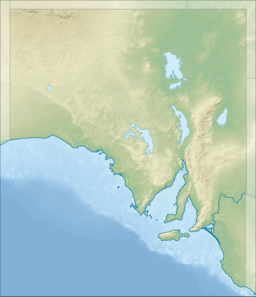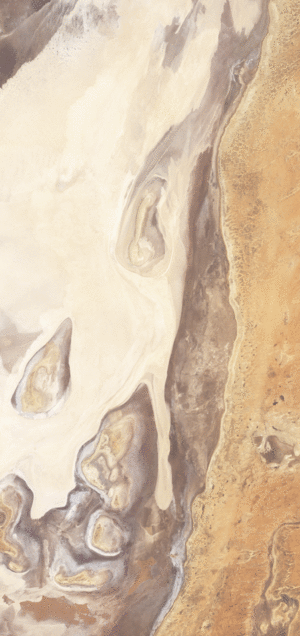Lake Frome facts for kids
Quick facts for kids Lake Frome / Munda |
|
|---|---|

Aerial view of Lake Frome / Munda
|
|
| Location | South Australia |
| Coordinates | 30°37′S 139°52′E / 30.617°S 139.867°E |
| Type | Endorheic |
| Native name | Munda (Adnyamathanha) |
| Basin countries | Australia |
| Designation | Lake Frome Regional Reserve |
| Max. length | 100 km (62 mi) |
| Max. width | 40 km (25 mi) |
| Surface area | 2,596.15 km2 (1,002.38 sq mi) |
| Max. depth | 0.5 metres (1 ft 8 in) |
| Surface elevation | 1 metre (3 ft 3 in) |
Lake Frome / Munda is a very large lake in South Australia, located east of the Northern Flinders Ranges. It is a shallow, dry lake bed covered in salt, also known as a salt pan. It is about 100 kilometres (62 mi) long and 40 kilometres (25 mi) wide.
This lake is called an endorheic lake. This means its water does not flow out to the ocean. Instead, any water that flows into it stays there until it evaporates. Lake Frome / Munda only rarely fills with water. This happens when there are big floods from the usually dry creeks in the Northern Flinders Ranges or from the Strzelecki Creek to the north.
The local Adnyamathanha people call the lake Munda. Europeans named it Frome after Edward Charles Frome, who mapped the area in 1843. In 2004, the lake was officially given both names: Lake Frome / Munda.
About Lake Frome / Munda
Lake Frome / Munda is next to Vulkathunha-Gammon Ranges National Park on its west side. To the north, it is connected to Lake Callabonna by Salt Creek. The southern Strzelecki Desert is to its east, and the Frome Downs pastoral lease (a large area of land used for grazing animals) is to its south.
Long ago, there was a huge ancient lake called Lake Mega-Frome. This super lake included what are now Lakes Frome, Blanche, Callabonna, and Gregory. It was last connected to Lake Eyre about 50,000 to 47,000 years ago. The area around Lake Frome / Munda gets very little rain and has very few people living there. The closest town is Arkaroola Village, which is about 40 kilometres (25 mi) northwest of the lake.
Getting to the Lake
Public access to Lake Frome / Munda is limited. There is only one rough four-wheel drive track that starts from the Vulkathunha-Gammon Ranges National Park headquarters at Balcanoona station. This track goes through flat, stony land, following Balcanoona Creek. This area is the only fully protected dry river system in Australia.
Along the way, the track crosses the Moomba-Adelaide natural gas pipeline and the dingo fence. After that, it goes over small sand dunes before reaching the western shore of the lake. The protected area where this track is located has special rules. It is a Cultural Use zone for hunting by the local Adnyamathanha Aboriginal people between 3:00 PM and 5:00 AM. During these hours, the public is not allowed to enter.
Cultural Importance
Munda is an important part of the local Dreaming stories of the Adnyamathanha people. These stories explain how the land and its animals came to be.
One Dreaming story says that the Rainbow Serpent Akurra drank all the water from Munda. This happened when Akurra went down Arkaroola Creek, which flows into Munda. Because of its importance in their Dreamtime, the Adnyamathanha people do not go onto the surface of the lake.
Protected Status
Lake Frome / Munda is very important for its unique geology. Because of this, the entire lake area was declared the Lake Frome Regional Reserve in 1991.
On November 26, 2021, the reserve's status was changed. It became the Lake Frome National Park. This upgrade recognizes its importance as a large salt lake, giving it the same protected status as other big salt lakes like Kati Thanda-Lake Eyre, Lake Torrens, and Lake Gairdner.
See also
 In Spanish: Lago Frome para niños
In Spanish: Lago Frome para niños
 | James Van Der Zee |
 | Alma Thomas |
 | Ellis Wilson |
 | Margaret Taylor-Burroughs |



